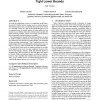Free Online Productivity Tools
i2Speak
i2Symbol
i2OCR
iTex2Img
iWeb2Print
iWeb2Shot
i2Type
iPdf2Split
iPdf2Merge
i2Bopomofo
i2Arabic
i2Style
i2Image
i2PDF
iLatex2Rtf
Sci2ools
126
click to vote
PODS
2006
ACM
2006
ACM
Randomized computations on large data sets: tight lower bounds
We study the randomized version of a computation model (introduced in [9, 10]) that restricts random access to external memory and internal memory space. Essentially, this model can be viewed as a powerful version of a data stream model that puts no cost on sequential scans of external memory (as other models for data streams) and, in addition, (like other external memory models, but unlike streaming models), admits several large external memory devices that can be read and written to in parallel. We obtain tight lower bounds for the decision problems set equality, multiset equality, and checksort. More precisely, we show that any randomized one-sided-error bounded Monte Carlo algorithm for these problems must perform (logN) random accesses to external memory devices, provided that the internal memory size is at most O( 4 N/logN), where N denotes the size of the input data. From the lower bound on the set equality problem we can infer lower bounds on the worst case data complexity of...
Related Content
| Added | 08 Dec 2009 |
| Updated | 08 Dec 2009 |
| Type | Conference |
| Year | 2006 |
| Where | PODS |
| Authors | André Hernich, Martin Grohe, Nicole Schweikardt |
Comments (0)

